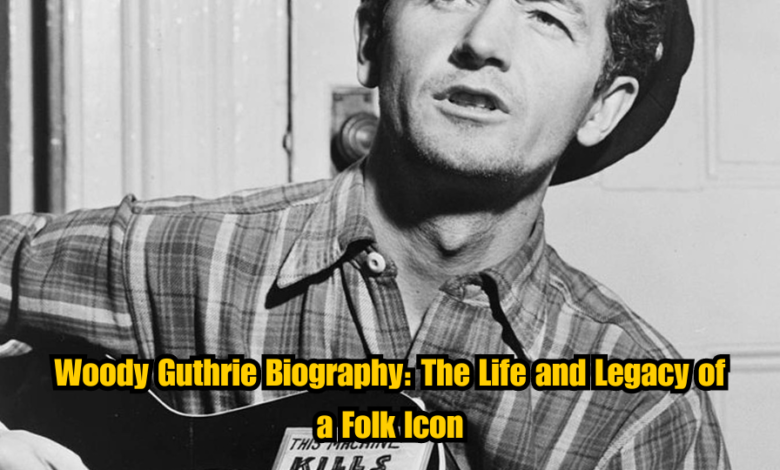Woody Guthrie Biography: The Life and Legacy of a Folk Icon

Woody Guthrie, one of the most influential and prolific American folk musicians, has left a legacy that transcends generations. Born Woodrow Wilson Guthrie on July 14, 1912, in Okemah, Oklahoma, his life and work have come to symbolize the struggles, hopes, and voices of the American working class during the first half of the 20th century. Guthrie’s songs, infused with political activism, empathy for the downtrodden, and an unrelenting passion for storytelling, have shaped the fabric of American music, inspiring countless musicians across a range of genres.
Early Life and Family Background
Woody Guthrie’s upbringing was marked by poverty, tragedy, and displacement. The Guthrie family, initially somewhat prosperous, was rocked by a series of catastrophic events. His mother, Nora Belle Tanner, suffered from Huntington’s disease, a degenerative neurological disorder, which led to erratic behavior and ultimately her institutionalization. Woody’s father, Charles Guthrie, experienced financial ruin due to failed investments and fires that destroyed much of the family’s property. These early hardships deeply influenced Guthrie’s worldview and became recurring themes in his songs—injustice, loss, and the resilience of the human spirit.
At the age of 18, Woody left home and began drifting across the country, taking odd jobs and experiencing the Great Depression firsthand. This exposure to the severe economic and social inequalities faced by millions of Americans helped to shape his political views and inform his music. It was during these travels that Woody honed his storytelling skills, collecting tales from the people he encountered and crafting them into his folk songs.
Musical Beginnings: The Dust Bowl Balladeer
In the 1930s, Woody Guthrie found himself at the epicenter of one of the most pivotal eras in American history: the Dust Bowl. His songs would come to represent the experiences of displaced farmers and working-class people affected by the environmental and economic calamities of the time. “Dust Bowl Ballads,” one of Guthrie’s most famous albums, is a powerful collection of songs chronicling the harsh realities of life during the Great Depression and the Dust Bowl.
“So Long, It’s Been Good to Know Yuh,” a standout track from this period, reflected the forced migrations of Okies and other displaced farmers, while also blending humor with the heartbreak of leaving behind their homes. Through his music, Guthrie gave a voice to migrant workers and the struggling masses. He was a staunch believer that folk music should be a weapon for change, using it to address the inequalities of the time.
Guthrie’s Political Awakening and Activism
Throughout the 1940s, Woody Guthrie’s music increasingly reflected his left-wing political views. His most famous song, “This Land Is Your Land,” written in 1940, was a direct response to Irving Berlin’s patriotic anthem, “God Bless America.” Disillusioned by the commercialism and romanticism of Berlin’s song, Guthrie penned “This Land Is Your Land” as a celebration of the common man and a critique of the growing economic divide in America.
The song, often misunderstood as a patriotic tune, originally included verses that expressed radical views on property rights and inequality:
“One bright sunny morning in the shadow of the steeple,
By the relief office I saw my people—
As they stood there hungry, I stood there wondering
If this land was made for you and me.”
During this time, Guthrie also became associated with leftist movements and the Communist Party, although he never formally joined. His music often reflected themes of solidarity with workers, particularly in songs like “Union Maid” and “Talking Union.” Woody’s political beliefs were not simply about party lines but about fighting for justice and equality for the oppressed.
Collaborations and Influence
Woody Guthrie was not a solo force; he was part of a broader folk music revival that sought to revive traditional American folk songs and create new ones that reflected the times. In the 1940s, he collaborated with Pete Seeger, Lead Belly, Cisco Houston, and Sonny Terry, among others. Together, they formed the Almanac Singers, a group known for its pro-union, anti-fascist songs during World War II.
Guthrie’s influence extended far beyond his contemporaries. His songs and style have been cited as major influences by artists like Bob Dylan, Bruce Springsteen, Joan Baez, and many more. Bob Dylan, in particular, idolized Guthrie, even visiting him in the hospital when Guthrie was suffering from Huntington’s disease in his later years. Dylan has often credited Guthrie with shaping his own songwriting and approach to folk music.
Woody Guthrie and World War II
As World War II loomed, Woody Guthrie’s focus shifted. Though he was an outspoken critic of fascism, Woody also supported the war effort once the United States entered the conflict. He served in the Merchant Marine and the Army, contributing to the war effort while also continuing to write and perform music. His wartime songs, like “Sinking of the Reuben James” and “The Great Dust Storm,” continued to reflect his deep connection to the struggles of ordinary people and his opposition to tyranny in all forms.
During this period, Guthrie’s work became even more prolific, though his health was starting to deteriorate due to Huntington’s disease. Despite his worsening condition, he never ceased to create, constantly writing down lyrics and ideas for songs that would go on to inspire future generations.
Huntington’s Disease and Later Years
By the late 1940s, Woody Guthrie began showing symptoms of Huntington’s disease, the same genetic disorder that had claimed his mother. His health gradually declined, leading to erratic behavior and difficulty performing. He was eventually hospitalized in the 1950s and spent the remaining years of his life in hospitals and care facilities.
Even during this difficult time, Guthrie continued to inspire a new generation of folk singers. Bob Dylan, among others, visited him frequently, bringing the folk revival of the 1960s to Guthrie’s bedside. The admiration and reverence for Guthrie’s work were palpable, as younger musicians recognized the deep social and political impact his songs had on American culture.
Woody Guthrie passed away on October 3, 1967, but his legacy as a champion of the working class, a fierce advocate for social justice, and a pioneer of American folk music has continued to grow.
Legacy: The Influence of Woody Guthrie
Woody Guthrie’s influence on American music and culture is immeasurable. His songs have been covered by countless artists, and his commitment to using music as a vehicle for social change remains a guiding principle for many musicians today. Guthrie’s simple yet profound lyricism and his dedication to addressing the concerns of the common people have made him a timeless figure in American music.
In 1998, the Woody Guthrie Archive was established to preserve his manuscripts, lyrics, and memorabilia, ensuring that future generations would continue to learn from his life and music. The Woody Guthrie Center, located in Tulsa, Oklahoma, stands as a testament to his enduring influence on music, art, and activism.
In modern times, Guthrie’s music remains relevant. His songs are still sung at protests, labor movements, and rallies for social justice, proving that his vision of America—a land of equality, freedom, and opportunity for all—resonates as strongly today as it did when he first penned “This Land Is Your Land.”
Woody Guthrie’s Discography and Major Works
Though Woody Guthrie’s work spans hundreds of songs, some of his most influential and widely recognized works include:
- “This Land Is Your Land”
- “Pastures of Plenty”
- “So Long, It’s Been Good to Know Yuh”
- “Do Re Mi”
- “Tom Joad”
- “Hard Travelin’”
- “Pretty Boy Floyd”
- “I Ain’t Got No Home”
His songs often centered on themes of poverty, migration, social justice, and human rights, capturing the spirit of an era and offering a voice to those who were often unheard. For those interested in exploring his full discography and learning more about his life’s work, the Woody Guthrie Foundation and the Smithsonian Folkways collection offer comprehensive resources.
Conclusion: The Everlasting Relevance of Woody Guthrie
In today’s rapidly changing world, where issues of inequality, displacement, and political division are still at the forefront of public discourse, Woody Guthrie’s music serves as a reminder of the enduring power of art as a force for change. His life, marked by hardship and resilience, mirrors the struggles of countless individuals who continue to fight for a better future. Guthrie’s legacy is not just his music, but the lasting inspiration he offers to activists, musicians, and ordinary people striving for a more just world.
For more information on Woody Guthrie’s influence, you can explore the Woody Guthrie Center and the Smithsonian Folkways archives, both dedicated to preserving the legacy of this iconic folk singer.



